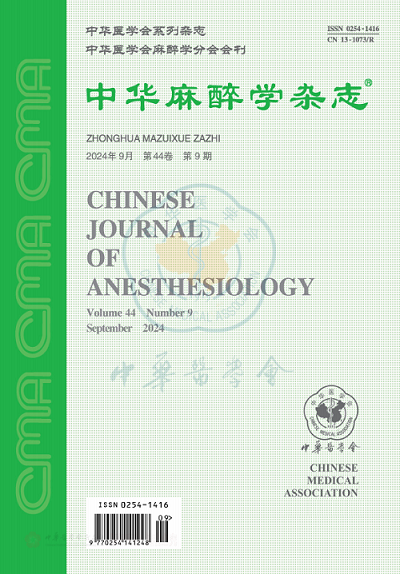Effect of thoracic paravertebral block combined with general anesthesia on early postoperative recovery of patients undergoing laparoscopic cholecystectomy
Q4 Medicine
引用次数: 0
Abstract
Objective To evaluate the effect of thoracic paravertebral block (PVB) combined with general anesthesia on the early postoperative recovery of patients undergoing laparoscopic cholecystectomy. Methods Sixty patients of both sexes, aged 45-64 yr, with body mass index of 18.5-32.0 kg/m2, with American Society of Anesthesiologists physical status Ⅰ or Ⅱ, were divided into 2 groups (n=30 each) using a random number table method: general anesthesia group (group GA) and thoracic PVB combined with general anesthesia group (group TPGA). Thoracic PVB was performed under ultrasound guidance at the right vertebral level T7 at 30 min before operation, and 0.375% ropivacaine 0.4 ml/kg was intermittently injected when air or blood was not found after withdrawing from the catheter at the angle between the T7 transverse process and the pleura in group TPGA.Lidocaine was injected for local infiltration anesthesia, and patients received no thoracic PVB at 30 min before operation in group GA.Patient-controlled intravenous analgesia (PCIA) was performed with sufentanil after operation in two groups.When the visual analogue scale score ≥4 points, tramadol 1-2 mg/kg or dizocin 0.1 mg/kg was intravenously injected for rescue analgesia.The intraoperative consumption of remifentanil, postoperative effective pressing times of PCIA, consumption of sufentanil within 2 days after operation, requirement for rescue analgesia, and development of nausea and vomiting were recorded.Quality of Recovery-15 was used to assess the early postoperative quality of recovery at 1 and 2 days after operation. Results Compared with group GA, the intraoperative consumption of remifentanil, postoperative effective pressing times of PCIA, consumption of sufentanil within 2 days after operation, rate of rescue analgesia and incidence of nausea and vomiting were significantly decreased, and Quality of Recovery-15 scores were increased at 1 and 2 days after operation in group TPGA (P<0.05). Conclusion Compared with general anesthesia, thoracic PVB combined with general anesthesia is helpful in promoting early postoperative recovery when used for the patients undergoing laparoscopic cholecystectomy. Key words: Nerve block; Anesthesia, general; Recovery胸旁阻滞联合全麻对腹腔镜胆囊切除术后早期恢复的影响
目的评价胸椎旁阻滞联合全麻对腹腔镜胆囊切除术后早期恢复的影响。方法60例男女患者,年龄45~64岁,体重指数18.5~32.0kg/m2,美国麻醉师学会身体状况Ⅰ或Ⅱ级,采用随机数表法分为全麻组(GA组)和胸部PVB联合全麻组(TPGA组),每组30例。术前30min在超声引导下在右椎体T7水平行胸部PVB,TPGA组在T7横突与胸膜夹角处拔管后未发现空气或血液时,间断注射0.375%罗哌卡因0.4ml/kg,GA组术前30min未行胸外PVB,两组术后应用舒芬太尼进行患者自控静脉镇痛(PCIA)。当视觉模拟量表评分≥4分时,静脉注射曲马多1-2 mg/kg或地佐新0.1 mg/kg用于抢救性镇痛。记录术中瑞芬太尼用量、PCIA术后有效按压次数、术后2天内舒芬太尼用量、抢救镇痛需求以及恶心呕吐的发展情况。恢复质量-15用于评估术后1天和2天的早期恢复质量。结果与GA组相比,术中瑞芬太尼用量、PCIA术后有效按压次数、术后2天内舒芬太尼用量、抢救镇痛率、恶心呕吐发生率均显著降低,TPGA组术后1天和2天恢复质量-15评分均有所提高(P<0.05)。结论与全麻相比,胸腔PVB联合全麻用于腹腔镜胆囊切除术有助于促进术后早期恢复。关键词:神经阻滞;全身麻醉;恢复
本文章由计算机程序翻译,如有差异,请以英文原文为准。
求助全文
约1分钟内获得全文
求助全文

 求助内容:
求助内容: 应助结果提醒方式:
应助结果提醒方式:


